Liberty University English 102: The Treatment of Death in Everyman
VerifiedAdded on 2023/05/28
|6
|1990
|286
Essay
AI Summary
This essay explores the treatment of death in the 15th-century morality play 'Everyman.' It examines how death is presented as a reality and an agent of God, offering psychological insight into the protagonist's journey. The essay analyzes the character of Death, Everyman's relationships with friends and possessions, and his ultimate realization of the importance of good deeds and knowledge. It further explains the play's depiction of death as an individual journey and a catalyst for change, highlighting the Catholic viewpoint and the path to eternal life. Ultimately, the essay argues that death should be seen as a learning experience and a transition to a better life, not as something to be feared, especially for those who have lived a righteous life. The essay concludes that Everyman undergoes a transformation, welcoming death as a righteous man prepared for eternal life with God.
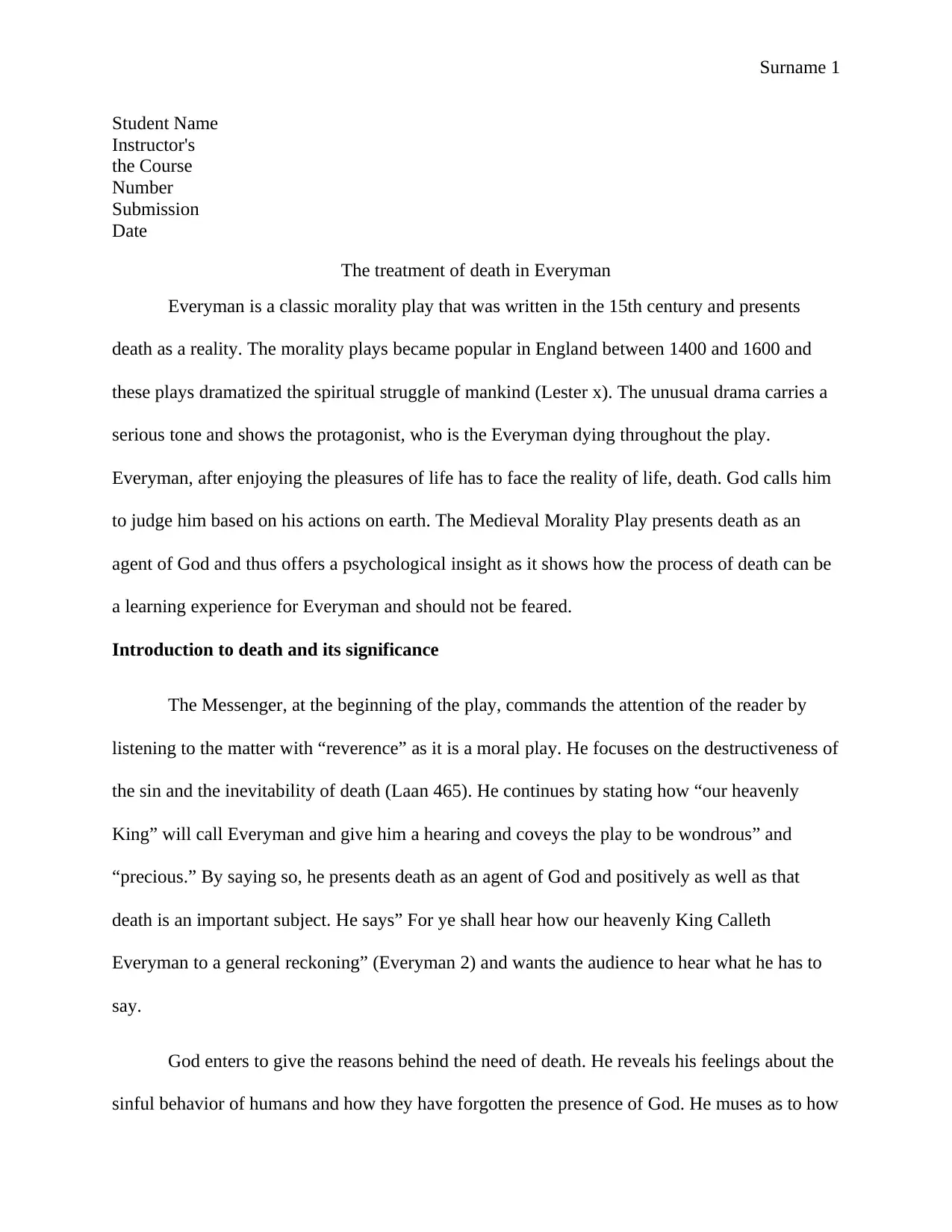
Surname 1
Student Name
Instructor's
the Course
Number
Submission
Date
The treatment of death in Everyman
Everyman is a classic morality play that was written in the 15th century and presents
death as a reality. The morality plays became popular in England between 1400 and 1600 and
these plays dramatized the spiritual struggle of mankind (Lester x). The unusual drama carries a
serious tone and shows the protagonist, who is the Everyman dying throughout the play.
Everyman, after enjoying the pleasures of life has to face the reality of life, death. God calls him
to judge him based on his actions on earth. The Medieval Morality Play presents death as an
agent of God and thus offers a psychological insight as it shows how the process of death can be
a learning experience for Everyman and should not be feared.
Introduction to death and its significance
The Messenger, at the beginning of the play, commands the attention of the reader by
listening to the matter with “reverence” as it is a moral play. He focuses on the destructiveness of
the sin and the inevitability of death (Laan 465). He continues by stating how “our heavenly
King” will call Everyman and give him a hearing and coveys the play to be wondrous” and
“precious.” By saying so, he presents death as an agent of God and positively as well as that
death is an important subject. He says” For ye shall hear how our heavenly King Calleth
Everyman to a general reckoning” (Everyman 2) and wants the audience to hear what he has to
say.
God enters to give the reasons behind the need of death. He reveals his feelings about the
sinful behavior of humans and how they have forgotten the presence of God. He muses as to how
Student Name
Instructor's
the Course
Number
Submission
Date
The treatment of death in Everyman
Everyman is a classic morality play that was written in the 15th century and presents
death as a reality. The morality plays became popular in England between 1400 and 1600 and
these plays dramatized the spiritual struggle of mankind (Lester x). The unusual drama carries a
serious tone and shows the protagonist, who is the Everyman dying throughout the play.
Everyman, after enjoying the pleasures of life has to face the reality of life, death. God calls him
to judge him based on his actions on earth. The Medieval Morality Play presents death as an
agent of God and thus offers a psychological insight as it shows how the process of death can be
a learning experience for Everyman and should not be feared.
Introduction to death and its significance
The Messenger, at the beginning of the play, commands the attention of the reader by
listening to the matter with “reverence” as it is a moral play. He focuses on the destructiveness of
the sin and the inevitability of death (Laan 465). He continues by stating how “our heavenly
King” will call Everyman and give him a hearing and coveys the play to be wondrous” and
“precious.” By saying so, he presents death as an agent of God and positively as well as that
death is an important subject. He says” For ye shall hear how our heavenly King Calleth
Everyman to a general reckoning” (Everyman 2) and wants the audience to hear what he has to
say.
God enters to give the reasons behind the need of death. He reveals his feelings about the
sinful behavior of humans and how they have forgotten the presence of God. He muses as to how
Paraphrase This Document
Need a fresh take? Get an instant paraphrase of this document with our AI Paraphraser
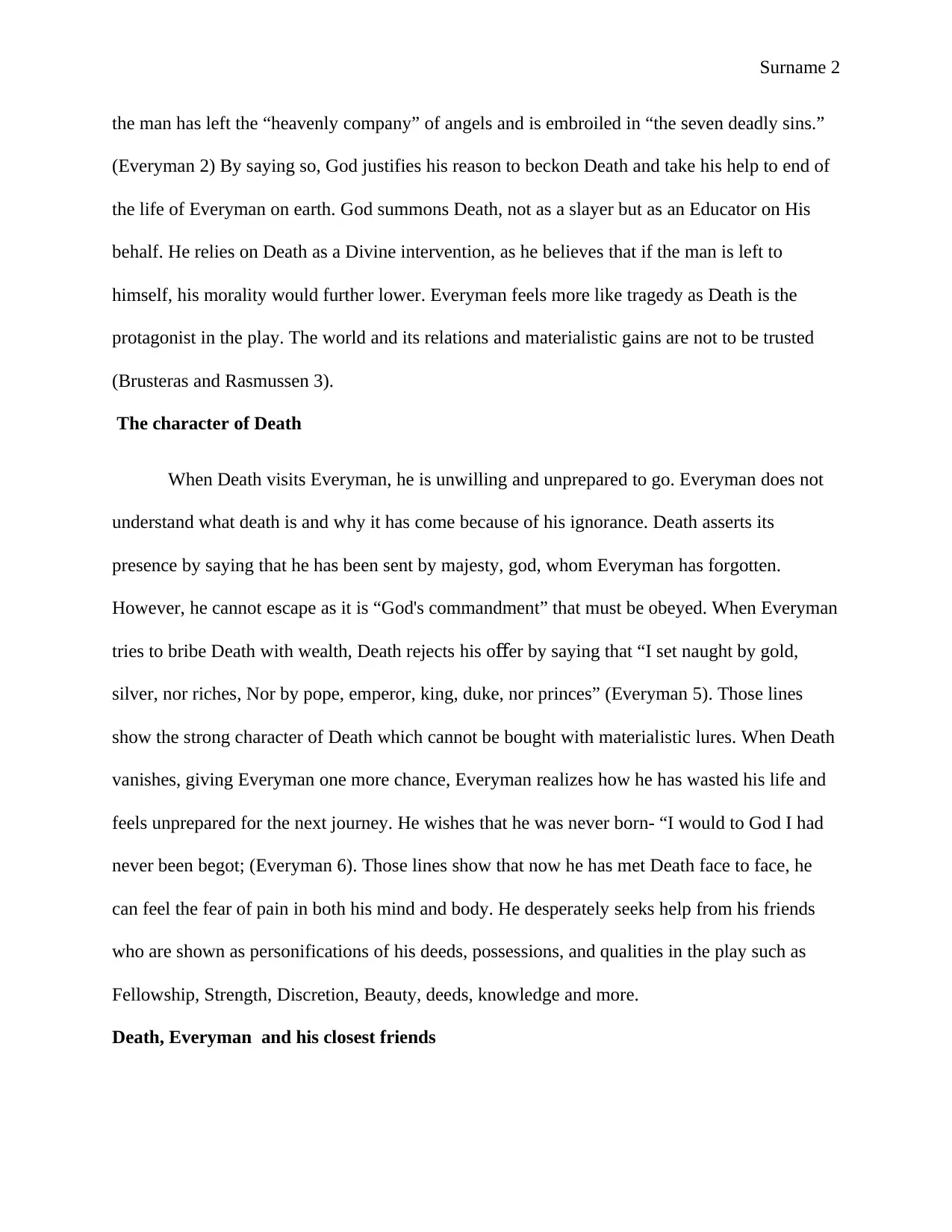
Surname 2
the man has left the “heavenly company” of angels and is embroiled in “the seven deadly sins.”
(Everyman 2) By saying so, God justifies his reason to beckon Death and take his help to end of
the life of Everyman on earth. God summons Death, not as a slayer but as an Educator on His
behalf. He relies on Death as a Divine intervention, as he believes that if the man is left to
himself, his morality would further lower. Everyman feels more like tragedy as Death is the
protagonist in the play. The world and its relations and materialistic gains are not to be trusted
(Brusteras and Rasmussen 3).
The character of Death
When Death visits Everyman, he is unwilling and unprepared to go. Everyman does not
understand what death is and why it has come because of his ignorance. Death asserts its
presence by saying that he has been sent by majesty, god, whom Everyman has forgotten.
However, he cannot escape as it is “God's commandment” that must be obeyed. When Everyman
tries to bribe Death with wealth, Death rejects his o er by saying that “I set naught by gold,ff
silver, nor riches, Nor by pope, emperor, king, duke, nor princes” (Everyman 5). Those lines
show the strong character of Death which cannot be bought with materialistic lures. When Death
vanishes, giving Everyman one more chance, Everyman realizes how he has wasted his life and
feels unprepared for the next journey. He wishes that he was never born- “I would to God I had
never been begot; (Everyman 6). Those lines show that now he has met Death face to face, he
can feel the fear of pain in both his mind and body. He desperately seeks help from his friends
who are shown as personifications of his deeds, possessions, and qualities in the play such as
Fellowship, Strength, Discretion, Beauty, deeds, knowledge and more.
Death, Everyman and his closest friends
the man has left the “heavenly company” of angels and is embroiled in “the seven deadly sins.”
(Everyman 2) By saying so, God justifies his reason to beckon Death and take his help to end of
the life of Everyman on earth. God summons Death, not as a slayer but as an Educator on His
behalf. He relies on Death as a Divine intervention, as he believes that if the man is left to
himself, his morality would further lower. Everyman feels more like tragedy as Death is the
protagonist in the play. The world and its relations and materialistic gains are not to be trusted
(Brusteras and Rasmussen 3).
The character of Death
When Death visits Everyman, he is unwilling and unprepared to go. Everyman does not
understand what death is and why it has come because of his ignorance. Death asserts its
presence by saying that he has been sent by majesty, god, whom Everyman has forgotten.
However, he cannot escape as it is “God's commandment” that must be obeyed. When Everyman
tries to bribe Death with wealth, Death rejects his o er by saying that “I set naught by gold,ff
silver, nor riches, Nor by pope, emperor, king, duke, nor princes” (Everyman 5). Those lines
show the strong character of Death which cannot be bought with materialistic lures. When Death
vanishes, giving Everyman one more chance, Everyman realizes how he has wasted his life and
feels unprepared for the next journey. He wishes that he was never born- “I would to God I had
never been begot; (Everyman 6). Those lines show that now he has met Death face to face, he
can feel the fear of pain in both his mind and body. He desperately seeks help from his friends
who are shown as personifications of his deeds, possessions, and qualities in the play such as
Fellowship, Strength, Discretion, Beauty, deeds, knowledge and more.
Death, Everyman and his closest friends
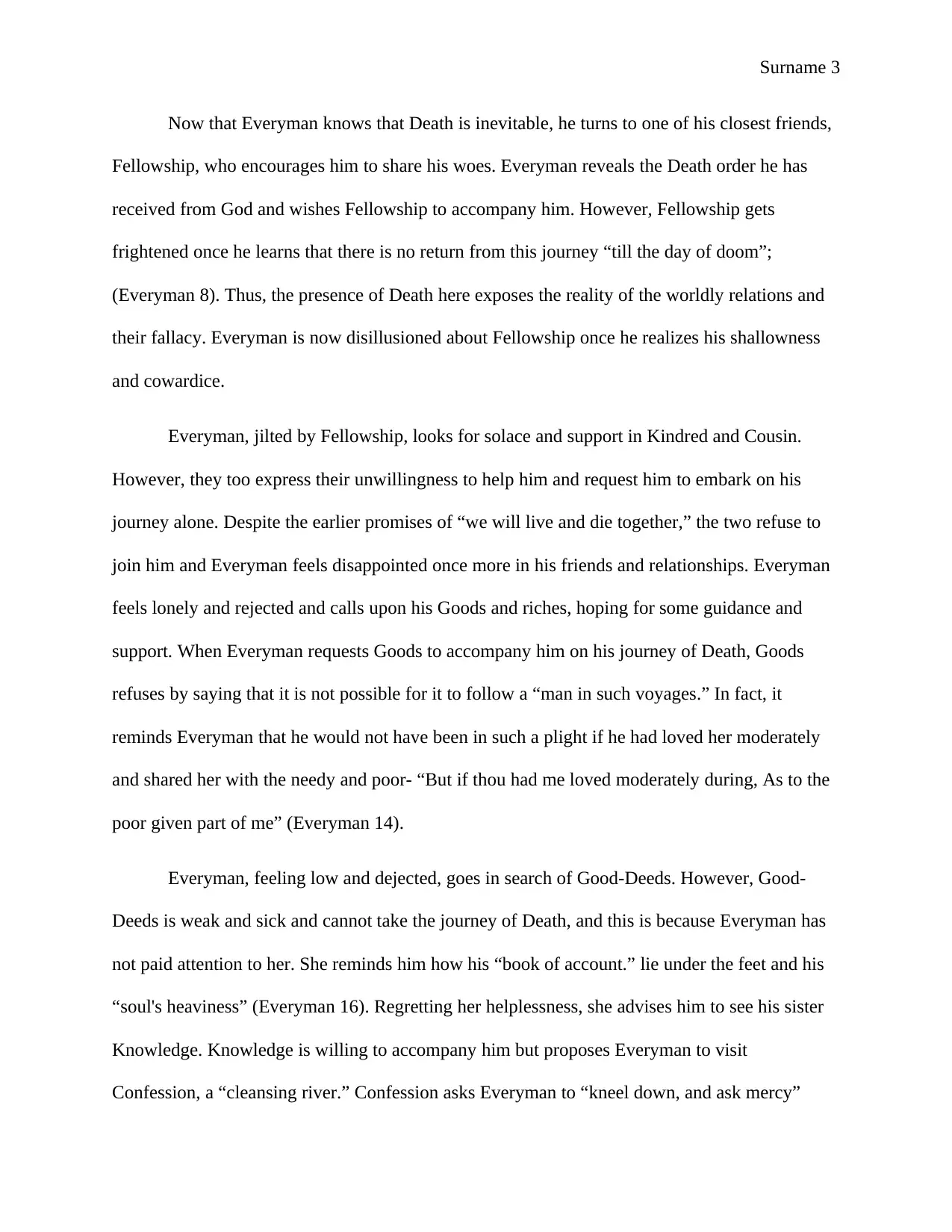
Surname 3
Now that Everyman knows that Death is inevitable, he turns to one of his closest friends,
Fellowship, who encourages him to share his woes. Everyman reveals the Death order he has
received from God and wishes Fellowship to accompany him. However, Fellowship gets
frightened once he learns that there is no return from this journey “till the day of doom”;
(Everyman 8). Thus, the presence of Death here exposes the reality of the worldly relations and
their fallacy. Everyman is now disillusioned about Fellowship once he realizes his shallowness
and cowardice.
Everyman, jilted by Fellowship, looks for solace and support in Kindred and Cousin.
However, they too express their unwillingness to help him and request him to embark on his
journey alone. Despite the earlier promises of “we will live and die together,” the two refuse to
join him and Everyman feels disappointed once more in his friends and relationships. Everyman
feels lonely and rejected and calls upon his Goods and riches, hoping for some guidance and
support. When Everyman requests Goods to accompany him on his journey of Death, Goods
refuses by saying that it is not possible for it to follow a “man in such voyages.” In fact, it
reminds Everyman that he would not have been in such a plight if he had loved her moderately
and shared her with the needy and poor- “But if thou had me loved moderately during, As to the
poor given part of me” (Everyman 14).
Everyman, feeling low and dejected, goes in search of Good-Deeds. However, Good-
Deeds is weak and sick and cannot take the journey of Death, and this is because Everyman has
not paid attention to her. She reminds him how his “book of account.” lie under the feet and his
“soul's heaviness” (Everyman 16). Regretting her helplessness, she advises him to see his sister
Knowledge. Knowledge is willing to accompany him but proposes Everyman to visit
Confession, a “cleansing river.” Confession asks Everyman to “kneel down, and ask mercy”
Now that Everyman knows that Death is inevitable, he turns to one of his closest friends,
Fellowship, who encourages him to share his woes. Everyman reveals the Death order he has
received from God and wishes Fellowship to accompany him. However, Fellowship gets
frightened once he learns that there is no return from this journey “till the day of doom”;
(Everyman 8). Thus, the presence of Death here exposes the reality of the worldly relations and
their fallacy. Everyman is now disillusioned about Fellowship once he realizes his shallowness
and cowardice.
Everyman, jilted by Fellowship, looks for solace and support in Kindred and Cousin.
However, they too express their unwillingness to help him and request him to embark on his
journey alone. Despite the earlier promises of “we will live and die together,” the two refuse to
join him and Everyman feels disappointed once more in his friends and relationships. Everyman
feels lonely and rejected and calls upon his Goods and riches, hoping for some guidance and
support. When Everyman requests Goods to accompany him on his journey of Death, Goods
refuses by saying that it is not possible for it to follow a “man in such voyages.” In fact, it
reminds Everyman that he would not have been in such a plight if he had loved her moderately
and shared her with the needy and poor- “But if thou had me loved moderately during, As to the
poor given part of me” (Everyman 14).
Everyman, feeling low and dejected, goes in search of Good-Deeds. However, Good-
Deeds is weak and sick and cannot take the journey of Death, and this is because Everyman has
not paid attention to her. She reminds him how his “book of account.” lie under the feet and his
“soul's heaviness” (Everyman 16). Regretting her helplessness, she advises him to see his sister
Knowledge. Knowledge is willing to accompany him but proposes Everyman to visit
Confession, a “cleansing river.” Confession asks Everyman to “kneel down, and ask mercy”
⊘ This is a preview!⊘
Do you want full access?
Subscribe today to unlock all pages.

Trusted by 1+ million students worldwide
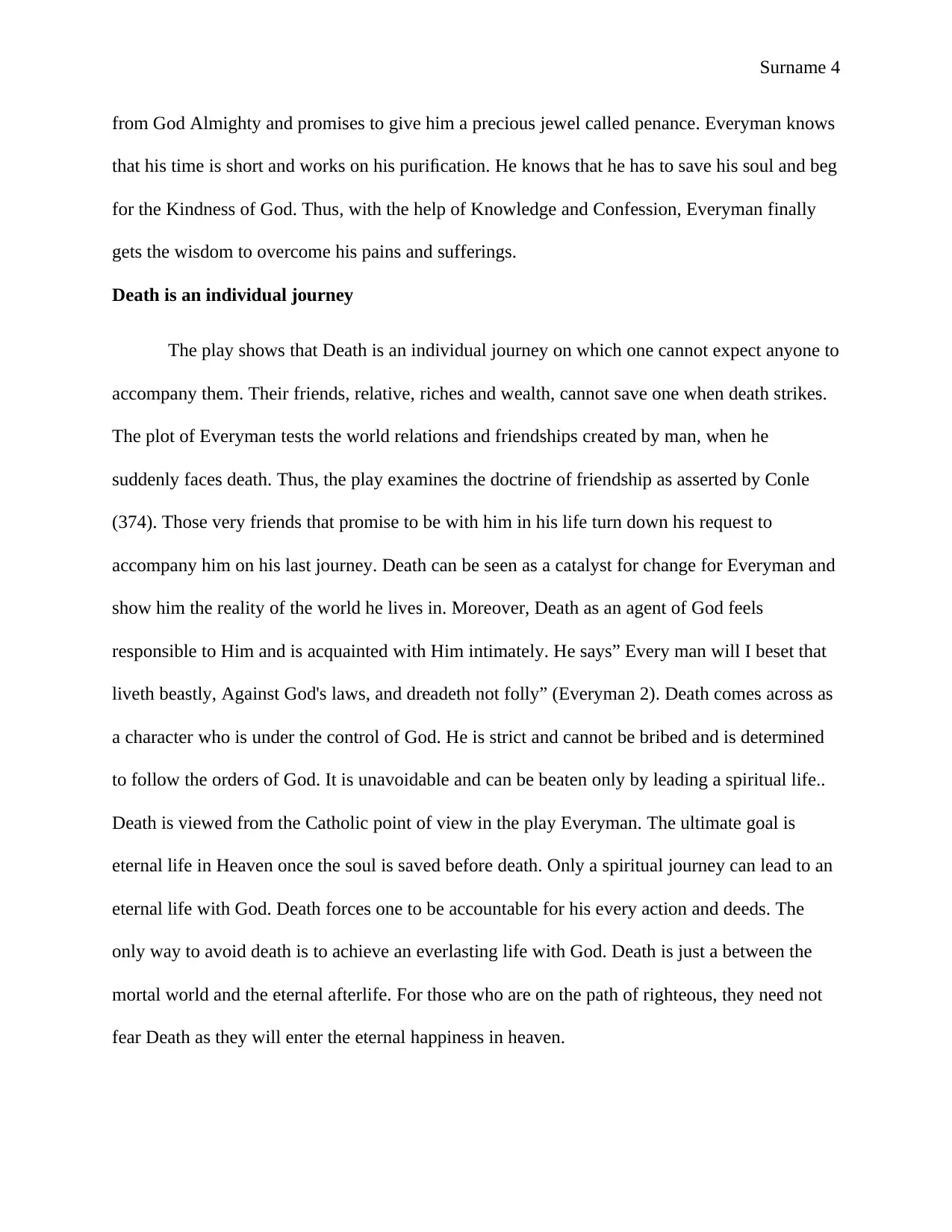
Surname 4
from God Almighty and promises to give him a precious jewel called penance. Everyman knows
that his time is short and works on his purification. He knows that he has to save his soul and beg
for the Kindness of God. Thus, with the help of Knowledge and Confession, Everyman finally
gets the wisdom to overcome his pains and sufferings.
Death is an individual journey
The play shows that Death is an individual journey on which one cannot expect anyone to
accompany them. Their friends, relative, riches and wealth, cannot save one when death strikes.
The plot of Everyman tests the world relations and friendships created by man, when he
suddenly faces death. Thus, the play examines the doctrine of friendship as asserted by Conle
(374). Those very friends that promise to be with him in his life turn down his request to
accompany him on his last journey. Death can be seen as a catalyst for change for Everyman and
show him the reality of the world he lives in. Moreover, Death as an agent of God feels
responsible to Him and is acquainted with Him intimately. He says” Every man will I beset that
liveth beastly, Against God's laws, and dreadeth not folly” (Everyman 2). Death comes across as
a character who is under the control of God. He is strict and cannot be bribed and is determined
to follow the orders of God. It is unavoidable and can be beaten only by leading a spiritual life..
Death is viewed from the Catholic point of view in the play Everyman. The ultimate goal is
eternal life in Heaven once the soul is saved before death. Only a spiritual journey can lead to an
eternal life with God. Death forces one to be accountable for his every action and deeds. The
only way to avoid death is to achieve an everlasting life with God. Death is just a between the
mortal world and the eternal afterlife. For those who are on the path of righteous, they need not
fear Death as they will enter the eternal happiness in heaven.
from God Almighty and promises to give him a precious jewel called penance. Everyman knows
that his time is short and works on his purification. He knows that he has to save his soul and beg
for the Kindness of God. Thus, with the help of Knowledge and Confession, Everyman finally
gets the wisdom to overcome his pains and sufferings.
Death is an individual journey
The play shows that Death is an individual journey on which one cannot expect anyone to
accompany them. Their friends, relative, riches and wealth, cannot save one when death strikes.
The plot of Everyman tests the world relations and friendships created by man, when he
suddenly faces death. Thus, the play examines the doctrine of friendship as asserted by Conle
(374). Those very friends that promise to be with him in his life turn down his request to
accompany him on his last journey. Death can be seen as a catalyst for change for Everyman and
show him the reality of the world he lives in. Moreover, Death as an agent of God feels
responsible to Him and is acquainted with Him intimately. He says” Every man will I beset that
liveth beastly, Against God's laws, and dreadeth not folly” (Everyman 2). Death comes across as
a character who is under the control of God. He is strict and cannot be bribed and is determined
to follow the orders of God. It is unavoidable and can be beaten only by leading a spiritual life..
Death is viewed from the Catholic point of view in the play Everyman. The ultimate goal is
eternal life in Heaven once the soul is saved before death. Only a spiritual journey can lead to an
eternal life with God. Death forces one to be accountable for his every action and deeds. The
only way to avoid death is to achieve an everlasting life with God. Death is just a between the
mortal world and the eternal afterlife. For those who are on the path of righteous, they need not
fear Death as they will enter the eternal happiness in heaven.
Paraphrase This Document
Need a fresh take? Get an instant paraphrase of this document with our AI Paraphraser
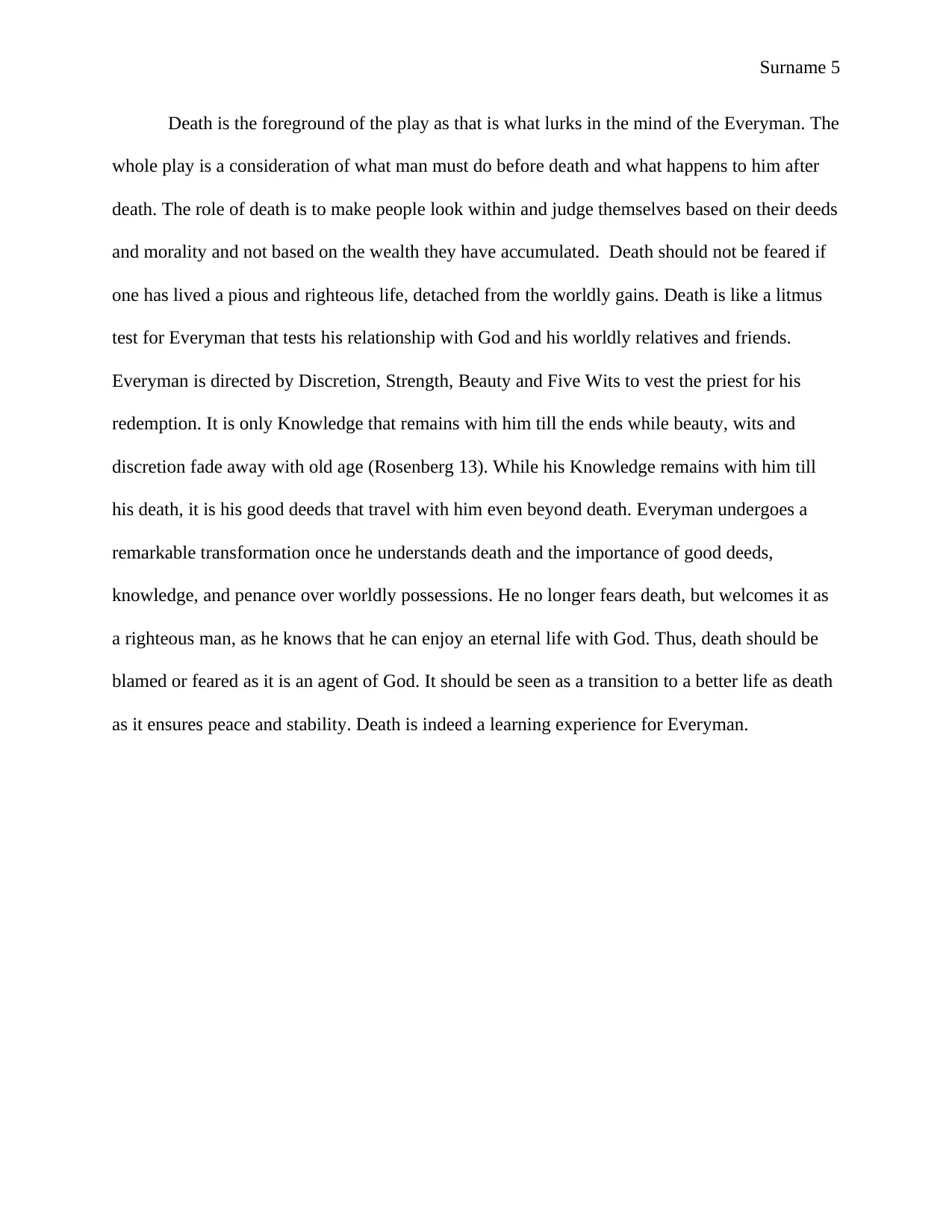
Surname 5
Death is the foreground of the play as that is what lurks in the mind of the Everyman. The
whole play is a consideration of what man must do before death and what happens to him after
death. The role of death is to make people look within and judge themselves based on their deeds
and morality and not based on the wealth they have accumulated. Death should not be feared if
one has lived a pious and righteous life, detached from the worldly gains. Death is like a litmus
test for Everyman that tests his relationship with God and his worldly relatives and friends.
Everyman is directed by Discretion, Strength, Beauty and Five Wits to vest the priest for his
redemption. It is only Knowledge that remains with him till the ends while beauty, wits and
discretion fade away with old age (Rosenberg 13). While his Knowledge remains with him till
his death, it is his good deeds that travel with him even beyond death. Everyman undergoes a
remarkable transformation once he understands death and the importance of good deeds,
knowledge, and penance over worldly possessions. He no longer fears death, but welcomes it as
a righteous man, as he knows that he can enjoy an eternal life with God. Thus, death should be
blamed or feared as it is an agent of God. It should be seen as a transition to a better life as death
as it ensures peace and stability. Death is indeed a learning experience for Everyman.
Death is the foreground of the play as that is what lurks in the mind of the Everyman. The
whole play is a consideration of what man must do before death and what happens to him after
death. The role of death is to make people look within and judge themselves based on their deeds
and morality and not based on the wealth they have accumulated. Death should not be feared if
one has lived a pious and righteous life, detached from the worldly gains. Death is like a litmus
test for Everyman that tests his relationship with God and his worldly relatives and friends.
Everyman is directed by Discretion, Strength, Beauty and Five Wits to vest the priest for his
redemption. It is only Knowledge that remains with him till the ends while beauty, wits and
discretion fade away with old age (Rosenberg 13). While his Knowledge remains with him till
his death, it is his good deeds that travel with him even beyond death. Everyman undergoes a
remarkable transformation once he understands death and the importance of good deeds,
knowledge, and penance over worldly possessions. He no longer fears death, but welcomes it as
a righteous man, as he knows that he can enjoy an eternal life with God. Thus, death should be
blamed or feared as it is an agent of God. It should be seen as a transition to a better life as death
as it ensures peace and stability. Death is indeed a learning experience for Everyman.
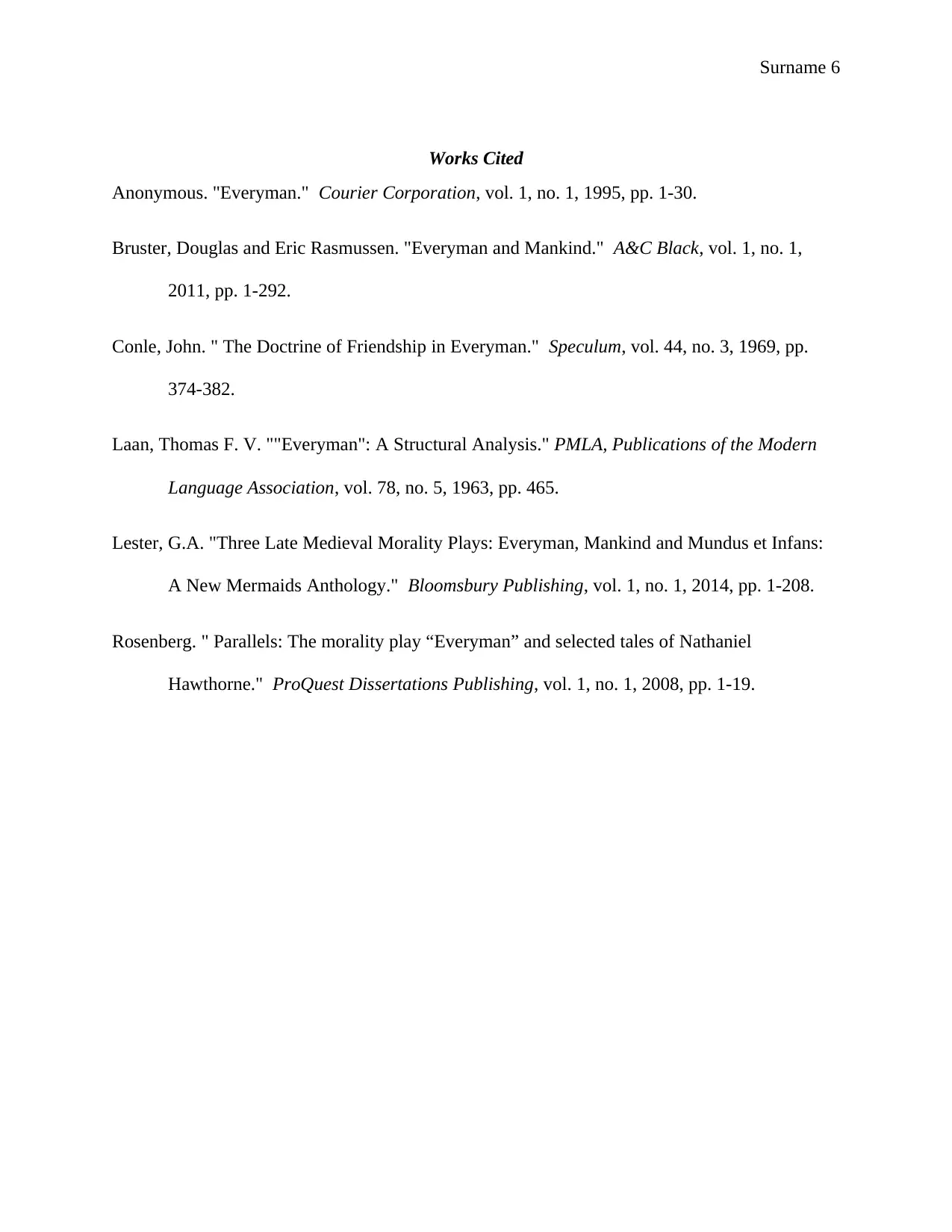
Surname 6
Works Cited
Anonymous. "Everyman." Courier Corporation, vol. 1, no. 1, 1995, pp. 1-30.
Bruster, Douglas and Eric Rasmussen. "Everyman and Mankind." A&C Black, vol. 1, no. 1,
2011, pp. 1-292.
Conle, John. " The Doctrine of Friendship in Everyman." Speculum, vol. 44, no. 3, 1969, pp.
374-382.
Laan, Thomas F. V. ""Everyman": A Structural Analysis." PMLA, Publications of the Modern
Language Association, vol. 78, no. 5, 1963, pp. 465.
Lester, G.A. "Three Late Medieval Morality Plays: Everyman, Mankind and Mundus et Infans:
A New Mermaids Anthology." Bloomsbury Publishing, vol. 1, no. 1, 2014, pp. 1-208.
Rosenberg. " Parallels: The morality play “Everyman” and selected tales of Nathaniel
Hawthorne." ProQuest Dissertations Publishing, vol. 1, no. 1, 2008, pp. 1-19.
Works Cited
Anonymous. "Everyman." Courier Corporation, vol. 1, no. 1, 1995, pp. 1-30.
Bruster, Douglas and Eric Rasmussen. "Everyman and Mankind." A&C Black, vol. 1, no. 1,
2011, pp. 1-292.
Conle, John. " The Doctrine of Friendship in Everyman." Speculum, vol. 44, no. 3, 1969, pp.
374-382.
Laan, Thomas F. V. ""Everyman": A Structural Analysis." PMLA, Publications of the Modern
Language Association, vol. 78, no. 5, 1963, pp. 465.
Lester, G.A. "Three Late Medieval Morality Plays: Everyman, Mankind and Mundus et Infans:
A New Mermaids Anthology." Bloomsbury Publishing, vol. 1, no. 1, 2014, pp. 1-208.
Rosenberg. " Parallels: The morality play “Everyman” and selected tales of Nathaniel
Hawthorne." ProQuest Dissertations Publishing, vol. 1, no. 1, 2008, pp. 1-19.
⊘ This is a preview!⊘
Do you want full access?
Subscribe today to unlock all pages.

Trusted by 1+ million students worldwide
1 out of 6
Related Documents
Your All-in-One AI-Powered Toolkit for Academic Success.
+13062052269
info@desklib.com
Available 24*7 on WhatsApp / Email
![[object Object]](/_next/static/media/star-bottom.7253800d.svg)
Unlock your academic potential
Copyright © 2020–2025 A2Z Services. All Rights Reserved. Developed and managed by ZUCOL.




